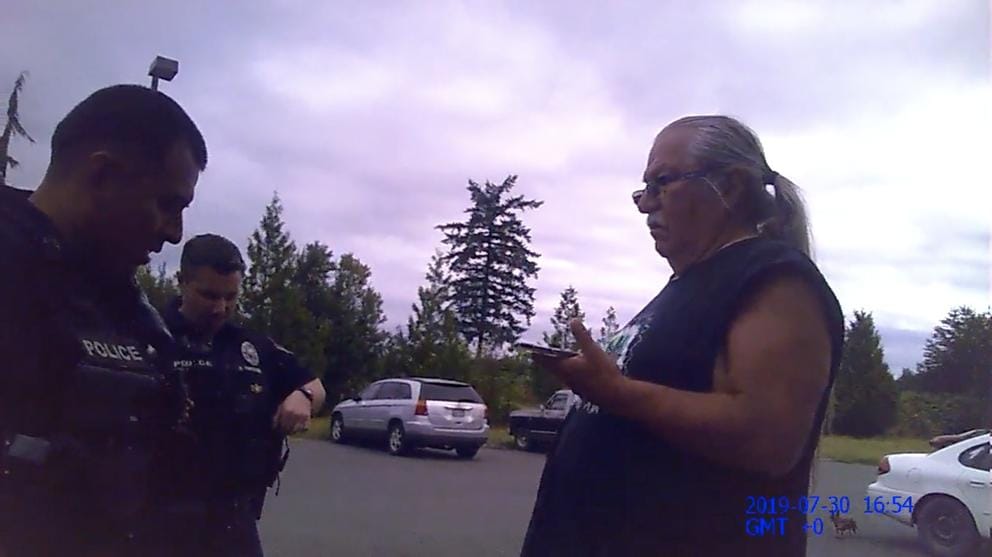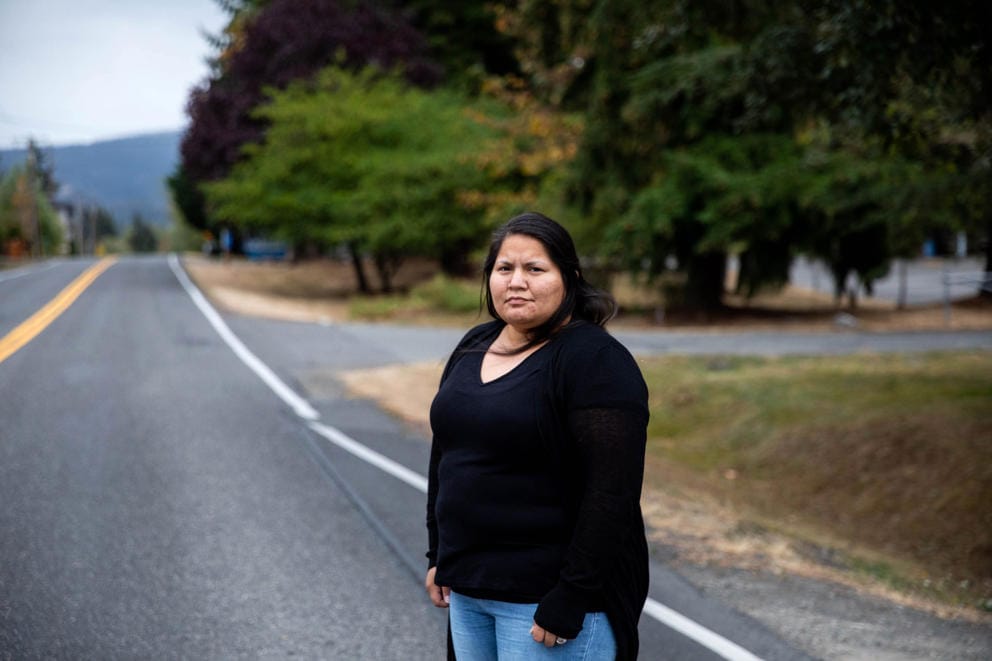A tribal elder and his daughter have settled their pain and suffering case against a Nooksack judge after what they describe as five years of harassment inside and outside the courtroom.
George Adams, says he was targeted by Judge Ray Dodge for his advocacy of 306 Nooksack citizens facing disenrollment.
Adams and his daughter, Elile Adams, settled their complaint against Dodge, Nooksack tribal Chief of Police Michael Ashby, and Nooksack police officers Francisco Sanchez, Daniel Bennett and Brandon Farstad for $35,000 on Sept. 15.
“No monetary settlement will ever compensate for the excesses of needless pain and suffering for my daughter and granddaughter and I,” George Adams said.
George Adams says the retaliation against him included dismissal from his job as the tribe’s language instructor. George addressed the tribal council in 2016 in Nooksack Lhéchelesem language, shaming them for their disenrollment efforts and rejecting their traditional ways. He was told to “Speak English!” by Tribal Chairman Bob Kelly and escorted out of the meeting. Later that year, the 306 Nooksack citizens were disenrolled.
Punishment v. protection
Adams’ daughter, Elile Adams, says she faced targeted harassment by Judge Dodge that resulted in more than 50 court appearances and, eventually, the only arrest of her life, according to a lawsuit filed in August 2019 in Whatcom County Superior Court against Dodge and the others.
In 2017, Elile, a domestic-abuse survivor, sought protection from her abuser, who is also her child’s father, in tribal court. Dodge agreed to a two-week protection order. “Those two weeks were the best because I didn't have to worry,” Adams said. “That was my safety net.”
When she returned to court after the two weeks, Dodge converted the domestic-violence protection order into a child-custody proceeding even though Adams had already been awarded full custody in Washington state court. Once Dodge started the custody proceedings, he personally directed the Nooksack Tribal Police Chief to investigate Adams for alleged custodial interference, according to a complaint filed by Adams in Whatcom County Superior Court.
The National Indian Court Judges Association Board of Directors rebuked Dodge’s appointment as Nooksack Chief Judge in March 2017, in response to a previous action that removed former Tribal Court Chief Judge Susan Alexander from the tribal court to push forward disenrollment efforts. The Board labeled that action, related to the disenrollment effort, as “a clear threat to judicial independence.” Despite this reprimand, Dodge remained the Tribal Court Chief Judge.
Throughout the next five years, Adams says she was required to come to court before Judge Dodge more than 50 times. She was told that if she missed court, custody would go to the child’s father. Visitation was awarded to the child’s father after a psychological assessment and under police supervision but Adams says her child did not want to go and she felt like she had to protect her.
According to a statement from the Nooksack Indian Nation, Adams failed to produce her children for supervised visits with their father over a dozen times.
Her child's father was often absent according to Adams and missed, then stopped, coming to court in 2019.
Elile Adams says she reached her breaking point in April 2019. She took the extreme step of relinquishing her Nooksack citizenship and “sought asylum” with the Lummi Nation, where Judge Dodge and the Nooksack tribal court would no longer have jurisdiction over her and her daughter.
“I was just like, ‘I can't take this anymore. I can't keep going to court. I have to start living my life. I have to have to move on,’ she said.”

Elile Adams and George Adams during their canoe journey in 2019. (Courtesy of Indigenous rights attorney Gabe Galanda of Galanda Broadman)
Seeking safety
In July 2019 her attorney came to court in her place so that she and her father could participate in the annual canoe journey, a gathering that brings together Indigenous nations from the Pacific Northwest and Canada. Judge Dodge issued a warrant for her arrest for failing to appear.
According to the August 2019 lawsuit and body-cam footage, when three officers came to George’s door and asked if Elile was there, George stepped outside to talk to them with his lawyer on speakerphone. Outside, the officers grabbed his arms, slapped his phone out of his hand and kneed him in the groin before throwing him against a concrete sidewalk and stairway, injuring his hands and knees. George was placed in a chokehold, and while turning him around to handcuff him, the officers sprained some of his toes and broke his prescription glasses.
After George was detained and cited for obstructing a public official and resisting arrest, an officer walked inside the home, arrested Elile and jailed her for the first time in her life.

George Adams encounters Nooksack police with his lawyer on the phone on July 30, 2019. George was detained and cited for “obstructing a public official” and “resisting arrest.” Elile was also arrested and jailed after Judge Dodge issued a warrant for her arrest for failing to appear in court. (Courtesy of Indigenous rights attorney Gabe Galanda of Galanda Broadman)
Cases closed
At the time, Elile Adams and her daughter were now enrolled Lummi Nation citizens, not Nooksack Tribal members. George explained this to the officers, but they ignored him and proceeded with the arrest. Deputy David Kimball, who booked Elile into Whatcom County Jail, called the charge against her “bogus,” according to the lawsuit she and her father filed later that month.
A month later, Judge Dodge countersued for libel. Dodge did not respond to requests for comment.
Because tribal police are federally funded, the U.S. government got involved in the civil lawsuit against Dodge and the offending officers. A companion federal case that Elile Adams filed against Dodge and the Nooksack Tribal Court eventually made it all the way to a petition of the U.S. Supreme Court. It ended after the Nooksack tribal court dropped its case when it lost contact with Elile’s daughter’s father, from whom she had sought the 2017 protection order.
“These frivolous lawsuits have cost the Nooksack Tribe and Whatcom County thousands of dollars and wasted valuable resources that could have been better spent to serve our constituents,” a June statement from the Nooksack Indian Tribe said.

Elile Adams near her home in Bellingham on Friday, September 23, 2022. (Amanda Snyder/Crosscut)
Hope out of heartbreak
Even though the Nooksack tribal court case was dismissed, charges were dropped and bail was refunded, Elile says she still carries anxiety and trauma from this experience. She describes the dismissal as being like a bad dream she was finally able to come out of. She says she will never be able to look at Nooksack the same, a statement which brought her to tears. “To be a part of [a tribe] for so long, and then you’re not anymore, it’s heartbreaking,” Elile says.
Elile still gets flashbacks and anxiety when she visits her father on the Nooksack reservation, but is finally beginning to get her life back. She said in a news release she “hopes her fight might inspire other Indigenous women who are abused by tribal actors ‘to stand up for what is right.’”
Relinquishing her Nooksack citizenship was incredibly difficult, though she has family in both Nooksack and Lummi Nations. Her daughter grew up on the Nooksack reservation, but Elile feels she did what was right for her and her daughter. “It’s really hard to let go,” Elile says. “I’m always going to be Nooksack.”



